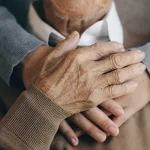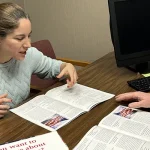
by Sylvia Blair, photography by Nikola Tzenov
It was clear early on that COVID-19 can wreak havoc on the body, with a host of issues ranging from respiratory distress to severe body aches. But what we also learned, with shutdowns and the stress that comes with living through a global pandemic, is that the coronavirus has health impacts even for those not actually infected with the virus. The pandemic and shutdown created the perfect storm for weight gain and associated health issues. Concerns over gaining weight and stress about missing workouts showed themselves on social media with hashtags like #quarantine15 and #coronacurves.
With shutdowns came new stressors, messed up sleep schedules, poor eating habits and lack of exercise. Pair that with binge eating, a newfound love for comfort food, and baking sweets to pass the time, and it’s easy to see how we put on a pound here and there.
According to a journal article on a National Institutes for Health website, a study done this spring suggests that roughly 22 percent of those surveyed reported gaining weight during self-quarantine. According to the study, factors that play a role in controlling weight during self-quarantine include getting adequate sleep, not snacking after dinner, practicing dietary restraint, altering stress coping mechanisms, and maintaining an exercise regimen.
Chris Carroll, 54, an Eldersburg resident, used to practice a rigorous exercise routine before the pandemic hit. He went to the gym four times a week at 5:30 a.m. before heading to work as a realtor. As a former rugby player and former ultra-marathon runner, it was not difficult to stay motivated. But when his gym closed, he struggled for about a month.
“With no place to go, and a broken routine, it was easier to not exercise,” said Carroll. “I felt sluggish and out of shape, and could tell the difference immediately,” he said.
Eventually, Carroll managed to get himself back on track with a little motivation and creative thinking. He installed a vertical bar in his home to do chin-ups and pull-ups, and created a “core” workout. Then, he got back into running outside, an activity he enjoys.
Emmerita Morris of Westminster also quickly felt the effects of poor eating and little exercise. Morris, a health care worker, found herself at home with her husband, and their 2- and 4-year old children, working longer hours than usual, while at the same time unable to find balance and blow off steam with her regular gym routine. To compensate for lack of gym time, she used YouTube workout sessions, virtual gym sessions, and invested in dumbbell weights.
Morris said that at the start of the pandemic, she was stress-eating while juggling the demands of her job and her family. Healthier meals were few and far between because of a shifting work schedule. Morris did do some cooking on the weekends, but weekdays were full of frozen, preservative- and sodium-laden processed foods.
“It was easier to buy pre-made food,” said Morris. “I also found myself eating quick snacks like potato chips, nuts and occasional candy bars, along with a few apples or carrots.”
“Motivation to work out was a struggle at home and I had many interruptions,” Morris said. “I missed the ability to focus well at the gym and to work out with peers and friends.”
Brad and Erin Durden, owners of CrossFit Iron Hammer in Westminster, tried to motivate clients and offer different workout options during the several month period that gyms were closed.
“Stress and boredom are key reasons why people gain weight in this pandemic,” Erin said. “When people are bored, they reach for the fridge and pantry. When people are stressed, they crave addictive things like sugar or dairy.”
Erin said that when you first eat a high-fat or high-calorie food, you can get a euphoric feeling and feel good for a short time. This is a vicious cycle which is hard to break when you are stuck at home and stressed out, she said.
Dr. Lucas Couch, a primary care physician with Carroll Hospital Center, said that establishing healthy habits can have a good effect on lifestyle. “When people start exercising and get in shape, it’s a long-term thing. The biggest bang for the buck is good nutrition. So eat sustainably and exercise daily for good lifestyle management,” he said.
The Durdens were forced to think outside the box when COVID-19 hit. With mandatory closures, the gym’s membership dropped from 90 members to roughly 60, and it was clear that people were struggling with the absence of normal gym routines. They began offering online programming and started virtual classes so members could see their peers and work out, from a distance, with their coaches. Erin created short home workout videos that members could access through an app and they added small outdoor classes, making sure to follow CDC distancing guidelines.

Before COVID-19, Marty Fisher joined Dani K Gym & Wellness in Westminster. Fisher, a medication technician at Sun Valley Assisted Living, said she lost 30 pounds working out four days a week. When coronavirus hit, her workout routine changed dramatically — she became less motivated to exercise, and she did not do cardio at home. But with the help of gym owner and personal trainer Dani Knight, Fisher said she is finding her way back to good habits.
“It is difficult to be motivated, and even though it’s hard, I am maintaining my habits,” said Fisher.
While there’s no way to tell what the fall and winter will bring, Fisher said she is committed to continuing her exercise routine because working out helps her mentally and offers great socialization time.
Before gyms were allowed to fully reopen in mid-June, Knight made accommodations for her clients by offering online services, and using a neighboring business’s parking lot for outdoor fitness classes throughout the week.
Knight said that it’s important for people to exercise to improve overall health and immunity and to get a total body and mind effect.
“I am trying to think outside of the box about how to help with the fitness journey, while adhering to CDC guidelines and protocol,” Knight said.
As gyms reopened in Maryland this summer and people began venturing out again, many were faced with the daunting task of working their way back to their pre-coronavirus weight. Fortunately, according to an article by a doctor at Yale Medicine, losing weight during the pandemic is entirely possible. Dr. John Morton, medical director of bariatric surgery at Yale New Haven Health System, recommends building new routines around what he calls the four pillars for weight loss: diet, exercise, sleep, and stress management.
Drew Welch, owner of Baltimore Sports Recovery in Westminster, is a licensed massage therapist, personal trainer, and a certified fascial stretch specialist. He encourages people to find ways to exercise even if they are unable to participate in their regular gym routines.
“If restrictions continue during the rest of the year, people can keep hiking (even when the weather gets cooler). Use a stationary bike indoors, continue with online fitness classes, or do bodyweight exercises in the living room. People don’t want to lose the momentum they have already gained,” said Welch.
And while nutrition and exercise are important components of an overall healthy lifestyle, there is more to consider.
Tina Brown, a licensed clinical professional counselor, who practices at the Center for Healing Arts in Westminster, stressed the importance of balance.
“People are out of balance these days, partly because of decreased social interaction. Many people really miss their gyms — which they see as their self-care time,” she said.
Brown suggested considering healthy alternatives, like getting outside to listen to nature sounds, or decorating the house in simple ways, or dressing up a little. It’s important to create beauty around us to self-soothe and to reduce anxiety, she said.














